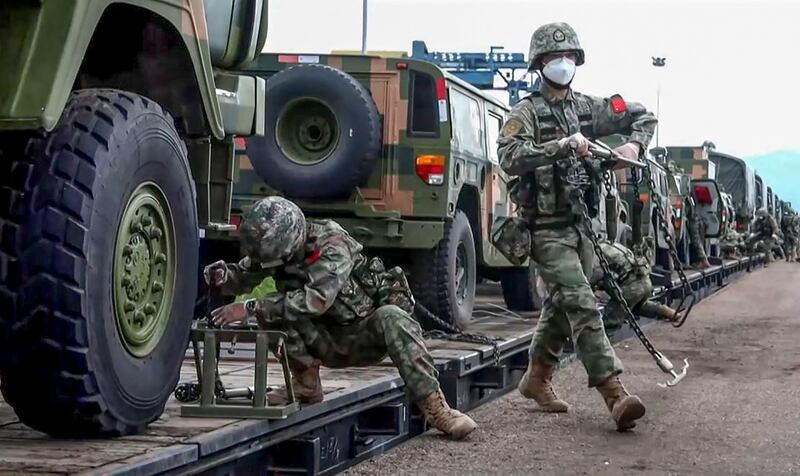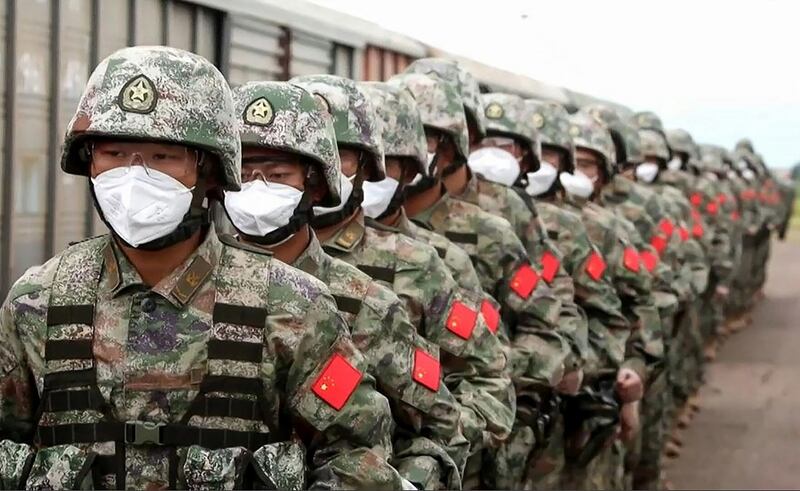A major multinational military exercise, Vostok-2022, got underway in Russia’s Far East amid a raging war in Ukraine and protests from Japan.
The Russian Defense Ministry said the drills are being held from Sept. 1 to Sept. 7.
More than 50,000 troops from 14 countries are taking part in the exercises, together with more than 5,000 weapons and other military equipment including 140 aircraft, 60 warships, boats and support vessels.
Two regional powers – China and India – have dispatched troops to Vostok-2022, with Beijing sending more than 2,000 troops, 300 vehicles of various types, 21 fixed-wing aircraft and helicopters, and three ships.
“With respect to China’s participation, I think the U.S. and its allies should be concerned,” said Artyom Lukin, Deputy Director for Research at the School of Regional and International Studies at Russia's Far Eastern Federal University.
“During Vostok-2022 Russia and China will conduct joint naval drills in the Sea of Japan, in close proximity to Japan,” said the Vladivostok-based scholar.
“This is, of course, a direct message to Tokyo and Washington,” he added.
According to the Russian Defense Ministry, “naval forces of the Russian Pacific Fleet and the People’s Republic of China will practice joint operations in the Sea of Japan to defend sea lanes and areas of maritime economic activity and assist ground forces in maritime directions.”
Messages to Tokyo
Tokyo lodged a protest with Russia as two islands claimed by Japan are included in this year’s training zones.
Japan’s Chief Cabinet Secretary Hirokazu Matsuno told reporters earlier this week that two of the four islands, in what Japan calls its Northern Territories but which are under Russia’s control, have been picked as training grounds for the Russia-China joint drills.
Etorofu and Kunashiri islands, known as Iturup and Kunashir in Russia, are among the four southernmost Kuril Islands claimed by both Russia and Japan. The other two are Habomai and Shikotan.
Tokyo said the islands are an inherent part of Japan’s territory that Russia occupied illegally after World War II. It demanded that Moscow exclude them from Vostok-2022’s training plans.
Matsuno was quoted by Japanese broadcaster NHK as saying that Japan also expressed concern about Russia's increasing military activities near Japan "while the invasion of Ukraine continues."
Japan is “gathering information and will take appropriate measures,” the Chief Cabinet Secretary was quoted as saying.
On Aug. 24 Japan released its defense white paper, titled ‘Defense of Japan 2022’, in which it said that in recent years, “China and Russia have deepened their military cooperation.”
The two countries have conducted “long-distance joint flights from the East China Sea to the Sea of Japan and the Pacific Ocean every year since 2019,” the paper said.
The last one was carried out when leaders of Australia, India, Japan and the United States, known as the Quad, met in Tokyo to discuss regional security in May.
Ten naval vessels from Russia and China also jointly navigated around Japan in October 2021.
“It is believed to have been intended as a show of force against Japan,” the Japanese Defense Ministry said, adding that it would “closely watch these activities with grave attention continuously.”
Show of force
Participating countries in Vostok-2022 include Azerbaijan, Algeria, Armenia, Belarus, India, Kazakhstan, Kyrgyzstan, China, Laos, Mongolia, Nicaragua, Syria and Tajikistan.
India’s participation in the exercise is restricted to strategic command and staff drills. Delhi decided not to send any warships to joint maritime exercises with China and Russia, a move seen by analysts as a reluctance to upset Japan.
The White House has expressed concerns with Press Secretary Karen Jean-Pierre telling reporters on Tuesday that while participating countries make their own decisions, the United States “has concerns about any country exercising with Russia while Russia wages an unprovoked, brutal war against Ukraine.”
Yet the timing of Vostok-2022 is important, argued Artyom Lukin from Russia’s Far Eastern Federal University.
“Russia decided to go ahead with the drills despite ongoing battles in Ukraine,” Lukin said.
“This could be a message that, if needed, Russia is capable of conducting two major military operations, one in Europe and the other in the Asia-Pacific,” the analyst told RFA.
The Vostok (East in Russian) strategic drills are part of rotating annual exercises conducted by the Russian military.
The exercises rotate through Russia’s four main military commands - the Eastern, Western, Caucasus and Central commands.
This year’s drills are conducted by the Eastern Military Command, headquartered in Khabarovsk near the border with China.

Russia-China military cooperation
This is the first time the Chinese People's Liberation Army (PLA) has sent all three of its forces, the infantry, navy and air force, to participate in a single exercise with Russia.
The two countries have stepped up military cooperation in recent years.
A joint military exercise held in northwest China's Ningxia Hui Autonomous Region in Aug., 2021, involved more than 10,000 troops.
Two months later, in October, Russia and China conducted a four-day joint naval drill in the Sea of Japan and, after that, held their first joint patrols in the western Pacific.
Chinese and Russian air forces also conducted joint training near the Korean Peninsula in Nov., 2021, with Seoul claiming that two Chinese and seven Russian military aircraft intruded into its air defense identification zone.

Russia’s President Vladimir Putin and Chinese leader Xi Jinping held a summit in February, in which they praised the bilateral partnership as having "no limits" and "no forbidden areas of cooperation."
The Russia-initiated war in Ukraine has pushed the two countries even closer and Beijing has so far refused to condemn the Russian invasion.
Russia’s Defense Ministry said Vostok-2022 aims at improving “skills of commanders and headquarters in exercising command and control of combined arms and coalition forces to repel acts of aggression in the Eastern direction and in the Far Eastern maritime zone.”
“The drills will also check the preparedness of military command centers in planning operations in maritime areas, ensuring all-embracing logistics support, command and control of battlegroups in warfare,” it said.
